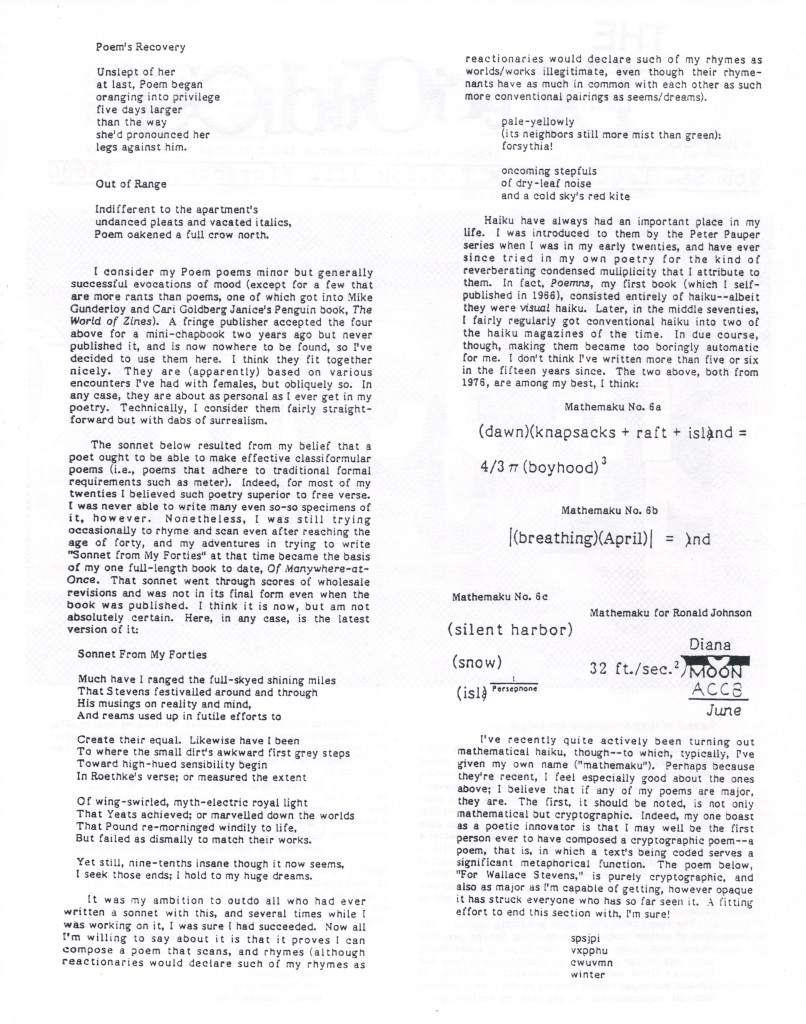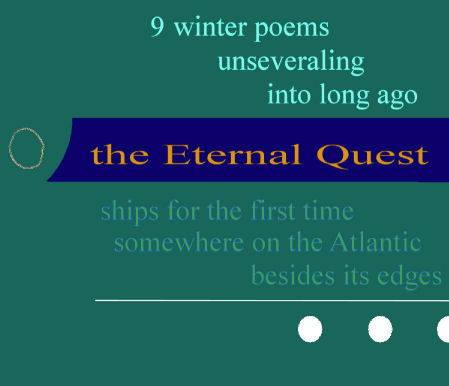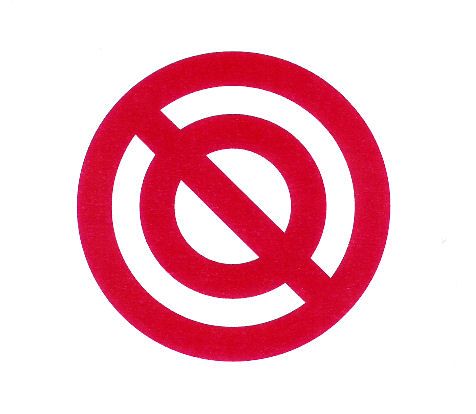Archive for the ‘haiku’ Category
Entry 1560 — Just a Haiku
Friday, September 5th, 2014
It’s by John Elsberg & Erik Greinke–the last haiku of a 6-haiku sequence called “Basho’s Sandals” from Catching the Light (2009, Cervena Barva Press), a collection of 12 such sequences:
moonlight on half the pond I don't know the splash beyond
Really nice extension of Basho’s old pond poem. A minor but perfect touch is “moonlight” all by itself to begin. Major is the huge light/dark, known/unknown dichotomy after that. I’d have this in any best poetry of 2009 anthology.
.
Entry 1505 — “The Boy on the Swing”
Saturday, July 5th, 2014
Entry 1502 — “A Snow-Effected Dream-Domain”
Wednesday, July 2nd, 2014
Here’s a poem from my poems of 1966. I came across it while looking for the poem in the same collection that I’m re-cycling in my latest long division poem:
Rather nice, I think–though out of season, especially now down here in Florida where the temperature during the day is in the nineties.
Personal Medical Update, 10 A.M. , 2 July: I’m still a step or two from having trained medical personnel have a look at me. I took three aspirins a little while ago thinking they might help my circulation, which I think is the problem.
.
Entry 1488 — Correction
Wednesday, June 18th, 2014
Anny Ballardini recently posted a haiku at NowPoetry about red cherries by Richard Wright with a second haiku about cherries under it that I took to be by Wright when I wrote about it there, and then posted that here, but which was actually by Anny. Fortunately, I said nice things about it:
stole two red cherries expensive in plastic baskets under the electric light me
Might as well say a little more about it. I claim a haiku should try for a haiku moment, and a haiku moment should have archetypal resonance. That brings us into subjectivity, I’m afraid. But a critic should be able to show how a haiku he rates as effective as I consider this one to achieve a haiku moment of archetypal resonance. Then the critic’s readers can decide for themselves whether he’s right or not.
(1) (to go through it again because Sound Practice can never be illustrated to many times!) I consider this haiku’s two images to be . . . well, it’s not that easy to sort it out; one image is a store’s expensive cherries bright lit; a second is the haiku’s speaker’s stealing two of them; but there is a third, the shoplifter all by herself, under an electric light (for me, “electric” in this crime scene, connotes the chair). I would combine the first two–in tension with “me” because: (1) a physical act versus (suddenly) a psychological state; (2) a scene versus the tiny focal point of the scene (which I see as tinily inside the scene, the perpetrator seeing herself stealing).
(2) The tension is resolved almost instantly with the reader’s empathetic realization of an archetypal fear: the fear of being found out. I’ve been doing a lot of thinking about instinctive human drives lately, and one of them I’m still trying to work out an effective description of is the need for the world’s approval. Or the need, as here, to avoid sustaining the world’s disapproval. I consider all major human drives to be archetypal, and this one is. It’s what makes us such conformists, even the most eccentric of us behaving like everyone else at least 97% of the time.
.
Entry 1585 — BG, Master American-Haiku-Critic
Sunday, June 15th, 2014
from a post to NowPoetry from Jesse Glass, whom I consider a superior knower of things Japanese although he is diffident about it, with my thoughts interspersed:
Hokku
Bits of song—what else?
I, a rider of the stream,
Lone between the clouds.
from an interesting old anthology titled The New Poetry eds. Harriet Monroe and Alice Corbin Henderson
* * *
Jesse: “I think the first line exhibits the Homer Simpson “d’oh!” factor to a high degree. The other two lines are fine.”
Me: “I discur about the first line, Jesse–my interpretation of this American haiku (because no longer in Japanese) is something like: ‘here I am again with nothing but a trivial poem–me–up there like a god, alone in the clouds.’ Ergo, the first line sets up the second: image of bits of anybody song in tension with some great stream in the sky only someone vastly above (in many senses) ‘bits of song’ can ride. Resolution of what seems to me a sort of metaphor: bits of song equal anything in Nature, however magnificent–with the implication that the speaker of the poem is a fool, or a slyly-ironic non-fool.
“Of interest to me is the fantasy of the second and third lines. Are traditional haiku allowed to indulge in sheer fantasy, Jesse? My impression is that they aren’t, but I’m not sure. I, of course, am all for allowing it. In any case, the rider in the sky’s is definitely metaphoric, and I know metaphors were banned–although I contend that just about all the best elderly haiku had juxtaphors, my name for implicit metaphors.
“Note: I take “hokku” to be a synonym for “haiku,” or too near to consider a different kind of poem. The Hokku above in American is a haiku, for me. But you might explain what the Japanese mean by ‘hokku,’ Jesse; I’m pretty sure you have a better idea of that than I.”
From: Anny Ballardini
Heaps of black cherries
glittering with drops of rain
in the evening sun
Richard Wright
Me: “This is a poor haiku because containing only one image, albeit a pleasant enough one.”
stole two red cherries
expensive in plastic baskets
under the electric light
me
Me: “This I like I lot. Either Wright caught on to hakuitry by the time he wrote it, or got lucky. It’s still very close to being just one image, but I interpret there to be two sets of images in effective hakuic tension with each other: the cherries under the bright light, and the boy, distant from them in space and mood, the cherries cheerful, the boy guilty–or proud; and the cherries in plastic baskets and the boy with two stolen cherries under the electric light, very visible to the authorities (standing out, ion fact, the way the printed word, ‘me,’ does on the page.
“Comments welcome, especially counter-comments. Show where I’m off, and you will qualify to be a master American-haiku-critic, first–or at least second-class.”
BG
Note from BG, the racist: I wish there were fewer streets named after Martin Luther King and more named after Richard Wright. (If I weren’t a racist, I’d want streets named after George Washington replaced with streets named after Richard Wright. No, name those after E. E. Cummings or Wallace Stevens or Theodore Roethke. Actually, we need no streets named after greater writers, because books of their work, or the electronic equivalent, are more than streets-enough for them.
Question from my hydrocodoned mood: what other writer in our country has written as entertaining and interlekshoolly-valuable a little essay in the past decade as the above? Or is as lovable (on paper)?(I took the hydrocodone to assure I did meaningful work on the essay regarding beauty I’ve been working on for months! I haven’t yet gotten to it almost two hours after taking my hit. Now I may.*
*It’s lucky I’m as old as I am. It’s scary how fast my lovability is increasing nowadays. If I were only twenty, it’d explode before I was fifty, and kill millions.**
**Aren’t the opponents of drug-addiction lucky I’m giving them so much good evidence against hydrocodone with stuff like this?***
*** Note, too, how the hydrocodone is keeping me from my essay on Beauty. Hmm, maybe that’s what’s good about it. Except that it will not keep me from it any longer. Later!
.
Entry 1362 — A Haiku Review
Wednesday, February 5th, 2014
For today, a haiku review first appearing in Modern Haiku, then reprinted in my From Haiku to Lyriku. It’s here because I needed something to post and pages 86 and 88 happened to be the pages I turned to when I opened that to grab something. But I like my haiku reviews, even though they never made me famous.
.
Entry 1205 — The Experioddicist, July 1993, P.2
Friday, September 6th, 2013
Entry 1119 — Dead Poem
Thursday, June 13th, 2013
Poem-in-progress:
I struggled with this thing most of yesterday–in my head. Just couldn’t get it right. I couldn’t choose between having the private eye and the Atlantic as its center. This morning, I kept foundering, finally giving up: hence the title of this entry. I tried to cheer myself up by think how good an instructional failure it was. Then something close to the above occurred to me that seemed to make some sense. I’m not yet satisfied with it. but may accept it into Mine Oeuvre as is.
Meanwhile, I like my private eye image. Haven’t been able to think what to do with it, though. (Thanks, Conrad, for your positive comment on it, by the way. You see the image just the way I do!)
.
Entry 1118 — Floundering
Wednesday, June 12th, 2013
I felt very good about my three haiku and how well they’d work in the long division I was hoping soon to get done. Then almost as though I were purposely trying to make a lesson out of the thing, I had second thoughts about it. Here are the haiku I had again:
rainy afternoon;
private eye (fictional)
exiting a cabthe Atlantic
before ships were anywhere on it
except its edges9 faint winter poems
unseveraling
into long ago
These made up what I would call the second draft of the poem, the first being the notes I displayed a few entries ago. I’m not counting the apeiron draft–the draft (really, drafts) in my head before I scribbled my first draft. (Love that word, “apeiron!” Thanks, Irving–for using it in one of the works of his I had in my latest Scientific American blog entry, as you all should very well know, having gone to it at least nine times since it was posted! It means the emptiness from whence everything came. More or less.)
Okay, first point I’m attempting with this lesson to instill in all those what wants to know what’s what when it comes to Poetry is that what I had when I’d scribbled my notes was a wholly unconsolidated item-cluster poem. I have no term for it, yet. There are those who prefer such a thing to any other kind because it lets the reader go pretty much wherever he wants to. Many tiny pleasures versus a large single pleasure that consolidation can yield.
My second draft, if we include the long division elements I spoke of that would go with it in the form I once thought it was headed for is a semi-consolidated item-cluster poem. I thought it was a fully-consolidated item-cluster poem but the unifying principle I’d worked out for it failed to effectively unify it, I thought. Still, there would be those who would prefer this version above any others–because reducing the risk of tedious wandering for meanings, but not forcing a quickly tedious single meaning on one–by allowing, that is, the reader to be creative.
My initial unifying principle was zero times private eye equals poems that put one into the past, and the mood the latter image suggests comes close to the mood suggested by the image of the Atlantic prior to Columbus’s voyages. Moreover, the 9 poems image will cause exactly the same mood the ocean image does if an ellipsis is tacked on to the text expressing it. I think my haiku excellently connotative but fail to lead to a mood that makes sense.
Here’s what I think the meaning of draft #2 approximates: reading about a private eye multiplies the zero one’s life is when one begins reading into the thrill of an ocean awaiting to be discovered over. The problem is that the detective is not close to being a Columbus.
rainy afternoon;
private eye (fictional)
exiting a cabships for the first time
somewhere on the Atlantic
besides its edges9 faint winter poems
unseveraling
into not yet
I’m not sure what I was up to when I changed my Atlantic haiku. I guess I thought my private eye was involved in a case, so wanted ships on the Atlantic that were involved in their equivalent. But their equivalent was much too consequential than whatever it was the private eye was involved in.
As for the poems, they were properly consolidating but “into long ago?” The detective was into the future not the past. Hence my change there. But now I want a fourth draft that keeps the private eye. I still want the poem to celebrate escape reading and the search for truth, but a lesser truth than Columbus’s discovery of the trans-Atlantic route to the New World Columbus made. My “not yet” is poor–just a marker I will surely improve on. Meanwhile, I have to dump my Atlantic haiku. No, not dump, just remove for use somewhere else.
Lesson to be continued when I have more to say.
.
Entry 1117 — 3 Haiku
Tuesday, June 11th, 2013
I’m pretty much out of it again, and have to pick up a new lawn mower then use it. So just the following haiku today:
rainy afternoon;
private eye (fictional)
exiting a cabthe Atlantic
before ships were anywhere on it
except its edges9 faint winter poems
unseveraling
into long ago
They are from the scribbled notes I posted two days ago, the final versions of my still-not-done new long division poem’s quotient, dividend and sub-dividend product, respectively.
.






 Communist Evolution
Communist Evolution NoNo
NoNo Transgender
Transgender